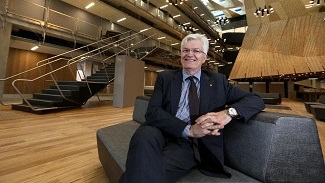Flexible learning model a win for workers, business
Melbourne's Glyn Davis MBA recognises that an MBA will not suit a rapidly changing workplace.
DON EDGAR
The Australian
March 28, 2018
The University of Melbourne's vice-chancellor Glyn Davis hopes to restructure postgraduate business courses radically to "better prepare graduates for coming disruption in the work environment" (Erica Cervini and Tim Dodd, The Australian, March 21).
This is encouraging but doesn't go far enough. The university system as a whole needs radical disruption if it is to meet the future needs of employers and employees. The present system is premised on the notion that education is a preparation for a job. The problem is, many current jobs won't exist in a few years and no degree course in itself will prepare people to find new ones.
What will be needed is lifelong education and re-education, specific retraining and self-reinvention in ways tertiary education is not designed to offer.
Davis confines his reforms to business programs. Following the recent report on his university's business education programs by Peter Nash, what Davis recognises is that a costly (and lengthy) postgraduate degree such as an MBA will not suit a rapidly changing workplace.
Instead, what is proposed is "stackable credentials", "short-term intensives" structured around workers' real-life time demands - a much more flexible and dynamic approach to business education.
Interestingly, business leaders were not enamoured with online courses and called for closer integration of work and learning programs, shorter courses that offered "just-in-time" learning that might be bundled into a postgraduate degree across time but that enabled regular upgrading to keep pace with changing workplace needs.
Why not apply the same principles to the whole university course structure? It may well be sensible to retain existing undergraduate degrees, preferably on the "breadth" model Davis has nurtured at Melbourne.
Too-early specialisation straight out of school is not advisable for many students and a more general/liberal education exposing undergraduates to a range of future possibilities seems to be preferred by many employers. The capacity to think, problem-solve and communicate is more essential than any specific course qualification and much of value is better learned on the job.
But there are 12.4 million Australians in the so-called "working age" group (9.63 million aged 25 to 54 and 2.8 million aged 55 to 64). Of them, 66 per cent have some form of post-school qualification (31 per cent a university degree or higher; 62 per cent a Certificate III or higher). In the 30 to 40 age group, more than 75 per cent have a higher education qualification.
All of them are likely to need further training, upskilling or re-education as career paths shift with technological and social change.
Retirement has become an obsolete word as life expectation increases to the 90s and people need an ongoing income and a sense of purpose in the second half of a longer life. Many over the age of 65 will want and will need to continue earning an income in a meaningful job.
Such people are not well catered for in today's higher education system. The abject failure of TAFE and its private competitors is just one part of the challenge. Universities cannot expect to attract these workers into higher degree courses unless they are offered in more flexible and job-relevant ways.
Several US universities are leading in lifelong learning. Stanford in California has a program linking workers, business leaders and shorter academic courses. AT&T, the big telecom firm, is co-operating with Georgia State University to provide short courses tailored to its employees' retraining needs. Students don't get a master's degree but they can accumulate credits towards one and both the employee and the employer benefit - one by not losing a job, the other by not losing the accumulated wisdom of experienced and trusted workers.
Blue-collar workers - janitors and tradesmen in large hotels and office buildings, for example - also can gain from such new college flexibility.
Computerisation may be able to locate a leak or electrical fault, but you still need someone to go fix it, so plumbers, sparkies and builders can be retrained to use the new technology and still apply their practical skills to fix the problem.
The need for retraining, upskilling and shifting gears is obvious in fields such as medicine, nursing, engineering, architecture, even law, yet universities fail to offer short "stacked" courses designed in co-operation with those professions that would enable workers entering middle age to avoid becoming "obsolete" and help their employers to retain and profit from their experience and organisational know-how.
Even at the undergraduate level, on-the-job experience combined with university study in relevant, intensive courses, staged in out-of-work hours, may stem the tide of university dropout rates.
Courses run jointly by academics and more hands-on, currently employed accountants, social workers, psychologists, nurses, teachers and others would have more appeal and be of greater value than a formal course requiring full-time enrolment and traditional measures of success. They would employ those older workers who wish to step down from full-time jobs, and bring real-life problem-solving to the often esoteric tasks set by academics with little practical workplace experience.
Some Australian universities (La Trobe, Griffith, New England, Deakin) have started designing "bespoke" courses, working with existing industries to make them more relevant and more time-appropriate to the vast numbers of working-age people who want and need to stay employed but who need to reinvent their areas of competence.
Davis, in his book The Australian Idea of a University (MUP, 2017), calls for more diversity and flexibility in university offerings, but not for his own university. This approach won't do for anyone in the future tertiary education sector
Don Edgar is co-author with Patricia Edgar of PEAK: Reinventing Middle Age (Text, 2017)












